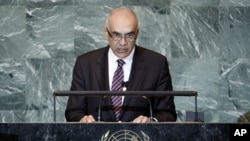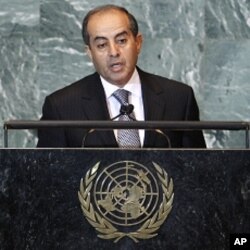The Arab Spring blew through the U.N. General Assembly hall on Saturday as Libya’s interim prime minister made his debut at the podium and called on the international community to lift sanctions against his country. He was followed by Egypt’s foreign minister, who hailed his people for overthrowing long-time leader Hosni Mubarak in February.
New Libya
Libyan interim Prime Minister Mahmoud Jibril spoke in New York as anti-Gadhafi forces in Libya made another push on Sirte, former leader Moammar Gadhafi's hometown and one of the few remaining towns that has not ceded to the National Transitional Council’s authority.
Jibril recalled Gadhafi’s one and only speech to the General Assembly annual debate in 2009, during which he ranted for more than an hour and dramatically tore up a copy of the U.N. Charter.
“Today I stand before you, excellencies, to show the world that a new Libya is coming to life," Jibril said. "Libya that looks forward; Libya that has a view to redevelop itself; Libya that wants to heal its wounds; Libya that wants to overcome its pain, to reach out to the entire world. It wants to rebuild itself, to reform its history.”
Frozen assets
Jibril said his nation has too many citizens living in poverty, there is high unemployment and very poor healthcare and education. He called several times for the United Nations Security Council to unfreeze the country’s assets so it can pay for development.
“The asset freeze on our funds must be lifted as urgently as possible. Let me appeal to you from this rostrum: let the Security Council soon take the historic resolution to lift the freeze. The regime has fallen even though we have not liberated the entire homeland yet,” he said.
The Security Council has taken steps toward lifting the freeze on some Libyan banks and corporations unfreezing more than $16 billion so far, but has not lifted all the sanctions.
Foreign policy shift
Jibril also said his people want a radically different foreign policy than that of Moammar Gadhafi. He said Gadhafi sowed terror, fear and used blackmail in many regions of the world. He said the new Libya would seek international relations based on mutual respect, common interests and non-interference in the affairs of other states.
Jibril added that the United Nations, which intervened to protect civilians from attacks by pro-Gadhafi forces, would play a pivotal role in his country’s transition to democracy.
“We believe that the international organization, just as it was a faithful friend then, can now be a trustworthy partner in rebuilding my country. This is the major battle where we appeal for your help and assistance - political, economic, financial and technical,” he said.
New era, new face
Egyptian Foreign Minister Mohamed Kamel Amr also addressed the General Assembly, saying he stood before the gathering representing Egypt in a new era and with a new face.
“I am addressing you today whilst Egypt moves forward determined to complete the transition phase that arose from that remarkable transformative change,” Amr said.
He praised Egypt’s people who stood up for their belief in democratic reforms, human rights and fundamental freedoms, and praised the Army for supporting them, saying their stance would be remembered by history.
Palestinian statehood
But Minister Amr spoke more about the changes sweeping the region than in his country. He criticized the Middle East Quartet for their call Friday on Israel and the Palestinians to return to the negotiating table within a month, saying the Quartet’s vision is not “balanced” and failed to address the issue of Israeli settlements.
He also congratulated Libya and Tunisia for their revolutions, but expressed concern about lingering crackdowns on anti-government protesters in Yemen and Syria.





